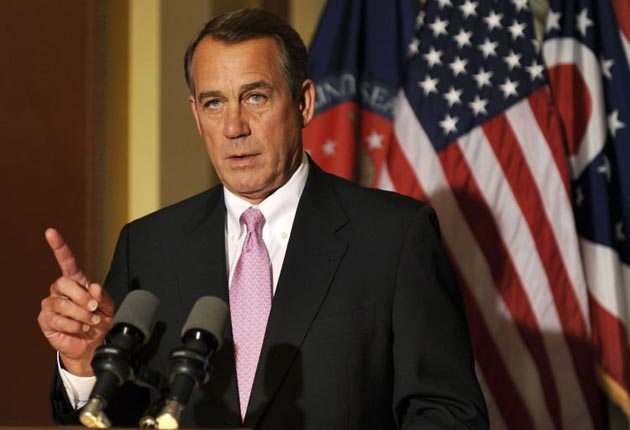Right-wing ideologues blamed as US risks government shutdown

The last fraught hours of budget negotiations between party leaders in Washington to avert a partial shutdown of the US federal government were being hijacked yesterday at the last minute by Republican demands for new restrictions on legal abortions for women, Democrats claimed.
As the race for an agreement came right down to the wire, there were some signs that the game of chicken between the parties was giving way to a serious attempt at compromise. "I believe there will be an agreement here shortly," said Mitch McConnell, the Republican minority leader in the US Senate. But any progress being made behind closed doors on a deal to keep government running but with significant spending level reductions for the next six months still risked being derailed by feuding over funding for Planned Parenthood clinics, which offer healthcare services for women that include counselling on abortion options.
If Americans were to wake up this morning to find that no deal had been struck, the consquences would be immediate. On the shutdown of the federal government almost a million federal workers would be told to stay at home and non-essential government services would be shuttered. First to notice might be tourists, who would find themselves locked out of national parks, monuments and museums.
The push for ever-deeper cuts has come from John Boehner, the Speaker of the House of Representatives, who has been the object of relentless cajoling to go further from conservatives and Tea Party members in his party.
As President Barack Obama continued to make his own attempts to broker a deal, Mr Boehner went before the microphones just hours before the threatened shutdown was to begin to insist that what divided Republicans from Democrats were the mathematics of the cuts he was seeking, not matters of policy such as abortion rights.
"There's only one reason we do not have an agreement as yet and that issue is spending," Mr Boehner, the top Republican in Congress, told reporters. "We're close to a resolution on the policy issues."
But in angry speech before fellow senators, Harry Reid, who leads the Democratic majority in the Senate, begged to differ. "Republicans want to shut down the government because they think there's nothing more important than keeping women from getting cancer screenings," he said. "This is indefensible and everyone should be outraged."
He later told reporters that as far as he was concerned the two sides had settled on cuts in the fiscal year that ends 30 September of $38bn (£23.2bn), a level that was already considerable more draconian than Democrats had initially contemplated. "The only issue left was women's health," he said. "This has been a moving target but now we've come to realize that the moving target is now focused on a bull'seye on women in America."
Those still hoping for a deal envisioned a short-term measure to keep government running at full tilt for the next few days while a final agreement on spending levels is sorted out and approved next week. Averting a shutdown at midnight was seemingly in the political interests of everyone. The last time the government was frozen by a budget impasse was in 1996 and the political fall-out was particularly severe for the then House Speaker, Newt Gingrich, who was on his own crusade for smaller government.
But President Obama and the Democratic leadership on the Hill fear damage to their own fortunes this time around. The entire 2011 budget should have been agreed and sewn up last year when the party had clear majorities in both chambers of Congress. Because of a failure of leadership by Democrats it did not happen. The chickens therefore are coming home to roost for them also.
Government shutdowns put a chill over Washington but are not generally noticed by the wider public, at least in the early days. Essential services, air traffic control, policing and national security measures, all continue as normal. Most inconvenienced are those federal workers who are deemed non-essential.
"The consequences of letting our country's funding expire would be devastating," Senator Reid said. ""Almost a million federal employees are waiting on pins and needles. Federal employees are like everybody else. They're working from paycheck to paycheck."
In theory, federal workers who are sent home will not be paid. It would be up to Congress to decide if the workers were entitled to back-pay compensation after a federal budget is finally agreed. That is what happened in 1996 and 1995.
Shutdown: The Effects
*An estimated 800,000 "non-essential" government workers would be sent on holiday. Congress is yet to decide whether they will be paid.
*All 394 National Park Service sites nationwide would close, leaving 20,000 employees idle. About 800,000 people usually visit the parks each day in April, spending $32m (£19.6m) every day.
*Passport offices would be closed, and all applications suspended.
*Salaries for military personnel serving overseas, including combat troops, would be delayed.
Join our commenting forum
Join thought-provoking conversations, follow other Independent readers and see their replies
Comments
Bookmark popover
Removed from bookmarks